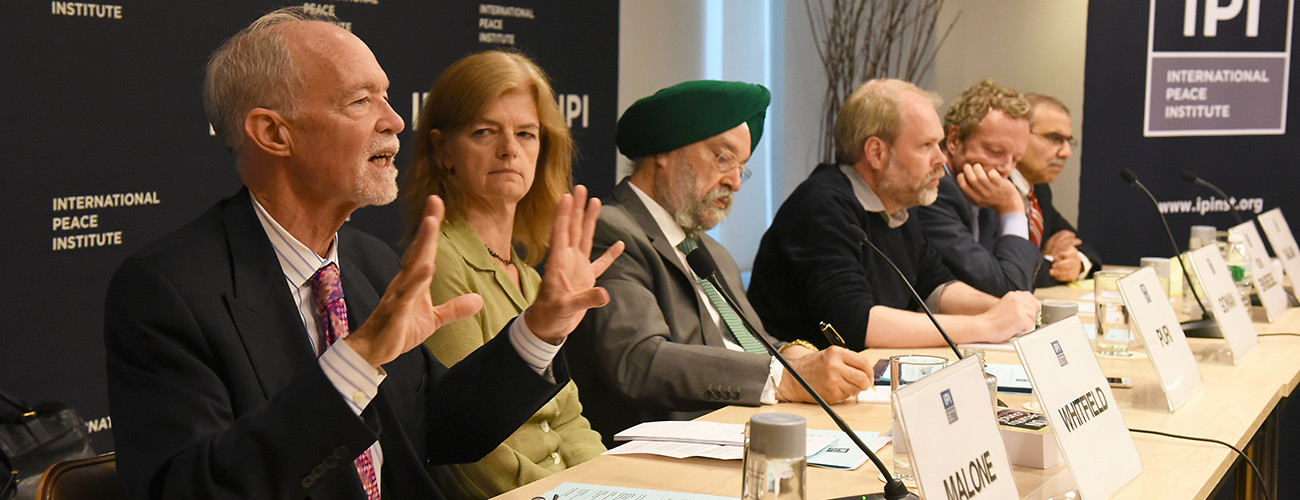The UN Security Council confronts a test of its relevance today as it struggles to meet the challenges of a new era, a key theme of the new book, The UN Security Council in the 21st Century. The book follows an earlier volume, The UN Security Council: From the Cold War to the 21st Century, which has become a standard reference volume on the council. The new book was launched on October 14 at a panel discussion at IPI.
“I think it’s a good time for a volume on the council,” said David Malone, Rector of the United Nations University and co-editor of the book. “At 70, the UN is getting a bit long in the tooth, the world is less interested in the UN than it should be, less interested than it has been at some times.”
Rethinking what the UN can be in the future is very important, Mr. Malone argued. “I think the UN is facing—if not a crisis of relevance—questions about its relevance, at a time when development is actually proving very successful in large parts of the developing world.”
Sebastian von Einsiedel, Director of UN University’s Center for Policy Research and co-editor of the volume, outlined a number of key trends and developments which have preoccupied the Security Council since the 2000s, including a dramatic resurgence of peacekeeping starting in 1999 which saw a ten-fold increase in troops. He said the area covered by peace operations today was twice the size of the Roman Empire at its peak.
A number of council resolutions adopted since the 2000s were of thematic nature, Mr. Einsiedel said, from Women, Peace, and Security to HIV/AIDs that really kicked off a new trend in the council’s broadening body of thematic issues.
In addition, he argued the rise of the counter-terrorism agenda after 9/11 became a force of both unity and division among the permanent five and sometimes between the permanent five and the rest of the council membership on issues such as human rights and council overreach. The Iraq War in 2003 also caused deep rifts at the UN and continues to affect it today.
“All events and development continue to play out in the more recent, potentially far more consequential, developments of the council, namely the rise of East-West tensions, concerns of the return of cold war paralysis on the council, including the rise of the veto specifically from China and Russia,” he stated.
Mr. Einsiedel noted that two trends seen in the council since 2000—the rise in consensus decision making and the rise in the use of Chapter Seven of the UN Charter, which allows members states to use all possible means, including military action, to enforce a UN resolution—have survived deep divisions over Syria and Ukraine.
He went on to list issues of shared interest within the council: civil war management in Africa in particular, counter-terrorism, nonproliferation, and to a lesser degree, organized crime.
Teresa Whitfield, Senior Adviser to the President at International Crisis Group and author of the chapter on the Groups of Friends, said the Security Council is not sufficient alone for conflict resolution. The actual capacity of the council to address, manage, and resolve conflict at the moment is very poor, she declared, stating that the council has given up on the idea of proactive conflict prevention.
Ms. Whitfield pointed out that in the last five years, every single indicator of armed conflict has gone up and migrants and refugees are at the highest levels since the World War II.
“The nature of conflict has changed and is changing and continues to change much more quickly than the rest of us can keep up with,” she said. “Conflicts are increasingly internationalized, dominated by the growing importance of non-state actors and transnational threats—violent extremism, climate change, economic crisis, nuclear proliferation, terrorism, organized crime, unauthorized of force, violations of human rights.”
The weakness and challenges to the state in multiple ways have all made conflict resolution much more difficult, she said. Yet despite this, she said, “The council remains the central, indispensable actor in international crisis management to the extent its politics allow.”
Through her work on Group of Friends, Ms. Whitfield found that the council is a resilient organization and that the environment around the UN provides a framework for continued consultations and discussions.
“The Security Council is a venue where important decisions and practices for conflict resolution can land,” she argued.
Richard Gowan, Non-Resident Fellow at the NYU Center on International Cooperation, discussed why the council struggles with peacekeeping, arguing that what the council mandates and what it expects proves to be impossible on the ground mainly because of a series of obstacles that arise between the creation of a mandate and its implementation.
The UN secretariat often acts to restrain the council especially when it comes to using force, he said, which can interfere with the council’s peacekeeping mission. Another is troop contributing countries which, although excluded from peacekeeping debates in New York, have immense power on the field to undermine the strategies and performance of peacekeeping operations.
Governments which peace operations are required to work with, Mr. Gowan said, sometimes view the UN as the enemy and actively work to undermine the work of peacekeepers.
“This breakdown in the relations between the council and host states is the single major strategic challenge in peacekeeping today,” he argued, “and is something the council has to address more effectively politically.”
The event was moderated by Hardeep Singh Puri, Vice President of IPI and Secretary-General of the Independent Commission on Multilateralism (ICM). Harald Braun, Permanent Representative of Germany to the UN provided opening remarks, and Nawaf Salam, Permanent Representative of Lebanon to the UN, served as a discussant.
Watch event:








